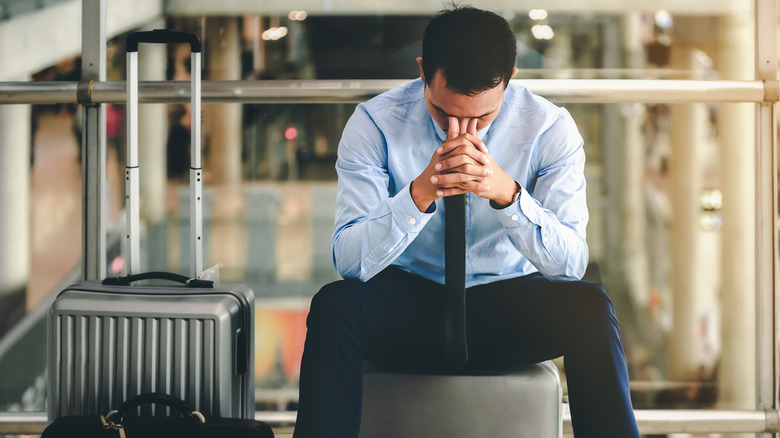Travel anxiety is a form of anxiety that emerges when someone feels stressed, nervous, or overwhelmed by the thought of traveling. This anxiety can show up in various ways, both physically and emotionally. Some people may experience symptoms like nausea, headaches, or an increased heart rate, while others might struggle with excessive worrying, fear, or even panic attacks.
Different aspects of travel can trigger this anxiety. For some, the idea of flying is particularly unsettling, with fears ranging from concerns about plane crashes to discomfort with turbulence or the feeling of being confined in an airplane. Others might feel anxious about venturing into unknown places, dealing with unfamiliar cultures or languages, or simply being in a new environment. There’s also the anxiety associated with navigating new locations, the fear of getting lost, or not being able to understand directions. Health and safety concerns can also play a significant role, with worries about potential illnesses or safety risks in a foreign place adding to the anxiety. Some individuals might find the logistics of travel stressful, from packing and going through airport security to dealing with unexpected delays or changes in plans. While travel anxiety varies in intensity from person to person, it can sometimes be so overwhelming that it prevents people from traveling altogether.
However, there are ways to manage this anxiety. Thoroughly planning a trip, creating a detailed itinerary, and knowing what to expect can help reduce feelings of uncertainty. Practicing mindfulness, deep breathing, or meditation can also be effective in calming anxious thoughts. Gradually exposing oneself to travel, starting with shorter, less challenging trips, can build confidence over time. In cases where travel anxiety is severe, seeking professional help from a therapist or counselor who specializes in anxiety disorders might be necessary. Understanding travel anxiety and finding ways to cope with it can enable people to enjoy their travel experiences more fully and minimize the stress that often accompanies travel.
Yes, it’s completely normal to experience anxiety before a trip. Many people feel a mix of excitement and nervousness as they prepare to travel, especially if the trip involves unfamiliar destinations, long flights, or complex logistics. This pre-trip anxiety can stem from concerns about the unknown, the fear of something going wrong, or simply the stress of getting everything in order before departure.
Even seasoned travelers may experience some level of anxiety, whether it’s about forgetting something important, navigating through airport security, or adjusting to a new culture or time zone. For some, the anticipation of the journey itself—such as flying or being in crowded places—can also trigger anxiety. While a little anxiety before a trip is common and often manageable, it’s important to recognize when it becomes overwhelming. If the starts to interfere with your ability to enjoy the experience or causes significant distress, it might be helpful to explore coping strategies or seek support to address these feelings. But in general, feeling a bit anxious before a trip is a normal part of the travel experience.
The most common trigger for travel anxiety is the fear of the unknown. When heading to an unfamiliar destination, you might feel uneasy about how you’ll be received upon arrival, what activities you’ll be able to enjoy, and whether you’ll reach your destination safely. Even when visiting familiar places, like returning home or visiting family, there about how the trip will unfold. If you focus only on the broader aspects of your journey and leave too many decisions to be made on the spot, you may find yourself overwhelmed by indecision when it comes time to plan your vacation activities.
To manage this uncertainty, it’s helpful to start your vacation with a basic plan. Identify the key experiences, sights, and activities you don’t want to miss. Once you have those important elements in place, allow yourself some flexibility with your schedule. This gives you the freedom to change plans, relax, or decide on the spur of the moment.
According to Dr. Potter, your plan should be detailed enough to prevent stress from uncertainty but flexible enough to accommodate changes. Avoid packing too many activities into a single day, and give yourself the option to rearrange your plans as needed.
If you ever find yourself feeling overwhelmed, pause and refer back to your plan. Consider whether there’s something you’d like to change or if you simply need a break. It’s perfectly fine to take it easy—after all, your vacation should be about maximizing comfort and minimizing stress.
Social anxiety is a condition characterized by an intense fear or discomfort in social situations where one may be judged, scrutinized, or embarrassed. For those with social anxiety, everyday interactions—whether it’s meeting new people, speaking in public, or even engaging in small talk—can trigger overwhelming feelings of nervousness and self-consciousness. The fear of being negatively evaluated or rejected often leads to avoidance of social situations altogether, which can significantly impact one’s personal and professional life.
People with social anxiety may experience a range of physical symptoms, such as sweating, trembling, a racing heart, or nausea, when faced with social situations. These symptoms can be so distressing that the anticipation of a social event may cause significant anxiety days or even weeks in advance. Social anxiety often stems from a combination of genetic, environmental, and psychological factors. For some, it may develop in early childhood or adolescence, often exacerbated by negative social experiences or overly critical environments. It’s important to note that social anxiety is not just shyness; it’s a persistent and intense fear that can interfere with daily functioning.
Despite its challenges, social anxiety is treatable. Cognitive-behavioral therapy (CBT) is a common and effective approach, helping individuals reframe negative thoughts and gradually face feared social situations. In some cases, medication may also be prescribed to manage symptoms. Additionally, practicing relaxation techniques, building social skills, and seeking support from loved ones or support groups can make a significant difference in managing social anxiety. Understanding and addressing social anxiety is crucial for improving quality of life and fostering more meaningful connections with others. With the right support and strategies, those affected can learn to navigate social situations with greater confidence and ease.
Fear of missing out, commonly known as FOMO, is the anxiety that arises from the belief that others are having rewarding experiences that you are not a part of. This fear can be especially intense in today’s social media-driven world, where we constantly see others’ highlight reels of adventures, successes, and social gatherings. FOMO creates a sense of urgency to participate in as many activities or experiences as possible, often leading to feelings of inadequacy, envy, or dissatisfaction with one’s own life.
FOMO can affect various aspects of life, including social interactions, career decisions, and travel. When it comes to travel, FOMO might make you feel pressured to visit every recommended site, try every local delicacy, or engage in every available activity, even at the expense of your own comfort or enjoyment. The fear that this might be your only chance to experience a particular destination can lead to overloading your itinerary, resulting in stress and burnout rather than relaxation and fulfillment.









